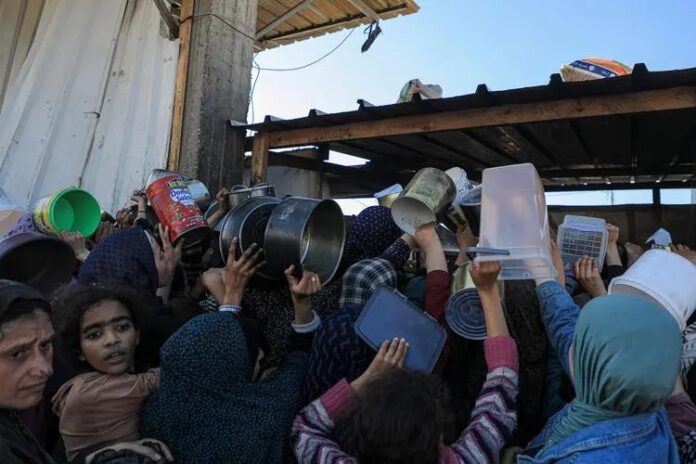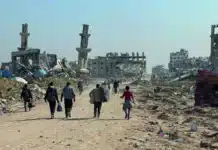Immediate ceasefire now! For working class global mobilisations against war and imperialism
Per-Åke Westerlund, ISA International Executive
(This article was first published on 14 March 2024)
On the first days of Ramadan, deaths from mass starvation are spreading in Gaza. Over 300,000 people in Northern Gaza face famine. And yet, instead of the necessary ceasefire, a major attack from the Israeli army on Rafah is still planned.
This as a result of over five months of bombings that officially killed more 31,000 Palestinians, wounded over 73,000 and completely destroyed most of the area.
North Gaza, the area first attacked and since then completely cut off from the rest of Gaza, received only 6 food trucks per day in February, with the UN food programme estimating 300 as the minimum needed. The Israeli army, as well as right-wing extremists, have blocked trucks from passing the Kerem Shalom border checkpoint from Israel to Gaza.
This extreme crisis led to the death of 120 people, when Israeli soldiers opened fire into a crowd trying to reach trucks carrying flour. ‘
The price of rice is 28 US dollars per kilo and potatoes 12 dollars. Families are left to bake bread from animal feed. Now mainly livestock fodder, together with grass and cactuses, as there is no longer any pigeon feed.
Sunday 10 March, the number reported dead from starvation was 25, most of them children, and rapidly increasing.
With famine and starvation reaching “catastrophic levels”, according to UN humanitarian co-ordinator Jamie McColdrick, the bombings from the Israeli air force continue. Hospitals have been demolished with no basic health care remaining. Last weekend, just after International Women’s Day on 8 March, health authorities reported 60,000 pregnant women suffering from malnutrition and lack of health care.
Two-faced Biden
The global outrage, also in the US, has even put pressure on the main supporter of the war. The Washington Post last week reported more than 100 arms sales from the US to Israel since 7 October, with only two of them being public.
Joe Biden’s administration has aroused hatred and a backlash on so many fronts. In the Middle East and the Global South, but also in Europe and the US, the war is seen as a proxy war, with the Israeli army fighting for US imperialism. This while both Beijing and Moscow work hard to stand out as critics of US imperialism. On 29 February, Putin organized a meeting in Moscow with representatives from Fatah, Hamas, Islamic Jihad and other groups formally to discuss “Palestinian unity”. However, both blocs in the New Cold War — US and Chinese imperialism — are only promoting their own interests, including close links with dictatorships in the region.
Already on his visit to Jerusalem following the 7 October Hamas attack and the start of the war, Biden warned of the results of the US wars in Afghanistan and Iraq after 9/11. The Taliban are back in power, and “Islamic State” became a force as a result of the US wars. In the Middle East today, the possibility of a regional war is a major threat. To further underline Biden’s dilemma, he is rapidly losing support for the coming presidential elections because of his stand on the war.
This explains the latest moves by the White House. They are not actions based on concerns for the Palestinians, nor will they cut the long term bond between US imperialism and the Israeli state. In a recent interview, while criticizing Netanyahu, Biden said there is no “red line” the Israeli government could pass resulting in the US withdrawing its support.
However, the level of open criticism of Israel and some of the measures this is provoking are unprecedented. Vice-president Kamala Harris has described the situation in Gaza as “inhuman” and Biden himself says Netanyahu’s government is “hurting Israel”.
In his State of the Union address, Biden announced plans to build a sea port in Gaza, for deliveries of aid. Before that, aid had also been dropped from the air. These are superficial Public Relations measures that will not avert hunger or disease. The air-dropped aid gives one meal every six days to 5% of Gaza’s population. The port will take 1–2 months to build and will be under the control of the Israeli army and there are big questions over what it can achieve. The project is a “glaring distraction”, commented Médecins Sans Frontières.
Negotiations
The negotiations involving government officials and agencies such as the CIA, from US imperialism, Qatar, Egypt, Israel and Egypt, were initially described as “promising”. For regional powers, it was a move to forestall coming social explosions caused by the war. Neither of the Cold War blocs want an escalation of the war or revolts that can shake the region.
The aim of these negotiations, however, was not a permanent ceasefire, but a temporary one for up to 6 weeks. In Israel and the US it was mainly described as a way to release hostages held by Hamas since 7 October. Hamas leaders demanded the release of Palestinian prisoners in Israel as well as a plan for a permanent ceasefire.
Inside Israel, Netanyahu and his government remain unpopular, but can still rely on support for the war. Netanyahu has again and again repeated the aim of the total elimination of Hamas and Israeli control over Gaza. The extreme right ministers such as security minister, Ben-Gvir, have threatened to leave the government and cause a crisis for Netanyahu if there was a new ceasefire deal.
A full scale offensive against Rafah will have catastrophic results. Warnings have been made of the risk for 30,000–85,000 deaths as a result. Egypt plays a key role in collaborating with Israel and the US over negotiations and the Rafah crossing. Fear that an attack would trigger social explosions of protests, not only in the Middle East, is behind Biden’s public warnings against such a move. The Israeli government has so far not implemented previous statements of a planned offensive from the start of Ramadan, 10 March, while continuing bombings and raids against Rafah.
Netanyahu’s hope to declare a total victory will be paid at the most terrible price for Palestinians, while at the same time not offering any solution. It has already caused mass hatred of Israel globally. The result will be increased insecurity and economic hardship in Israel itself, adding to the already growing discontent against the government.
Neither has US imperialism and its regional allies any solution. Gaza is totally destroyed and in the West Bank, increased violent attacks on Palestinians and plans for new settlements are further increasing the oppression of the occupation. Attempts to bolster the corrupt Palestinian Authority will not offer a way out.
In the short term, attempts from the Israeli forces to block the al-Aqsa mosque in Jerusalem during Ramadan can trigger new protests from Palestinian youth and across the region.
The cause of this war and crisis stem from the capitalist and imperialist system. Deals made within this system, such as the Oslo accord of 1993, leave power and control in the hands of the Israeli state, US imperialism and the regional dictatorships, state forces that facilitate the power of global capitalism. The international working class and the mass solidarity protests must expand mobilisations against the war, for an immediate permanent ceasefire, alongside a clear anticapitalist, socialist profile, without any illusions in any of the hypocritical governments or UN resolutions.




